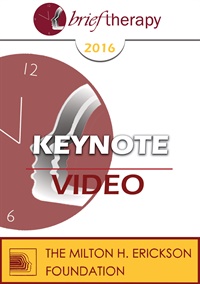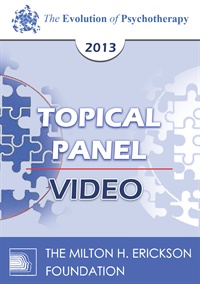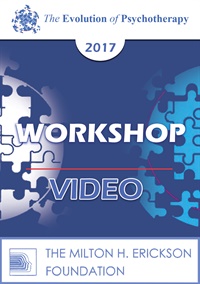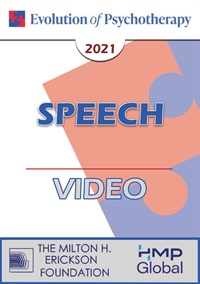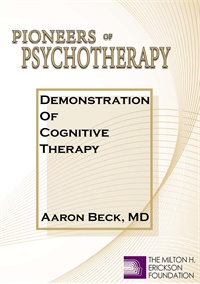
Credit available - Click Here for more information
- Average Rating:
- Not yet rated
- Topic Areas:
- Clinical Demonstrations | Abuse | Addiction | Psychotherapy | Role Play | Cognitive Behavior Therapy (CBT) | Relationships
- Bundle(s):
- Pioneers of Psychotherapy Bundle
- Categories:
- Pioneers of Psychotherapy | Online Continuing Education | Evolution of Psychotherapy | Evolution of Psychotherapy 1995
- Faculty:
- Aaron Beck, MD
- Course Levels:
- Master Degree or Higher in Health-Related Field
- Duration:
- 00:59:00
- Format:
- Audio and Video
- Original Program Date:
- Dec 15, 1995
- Short Description:
- Aaron Beck (1995) selects a clinician to role-play a male client. The client, Mike, was abandoned by his wife after she had multiple affairs. Mike is a recovering alcoholic with a sexually transmitted disease who suffers from dating anxiety, childhood trauma, and feelings of inferiority. Beck demonstrates how to establish a collaborative relationship with the patient.
- Price:
- $59.00 - Base Price
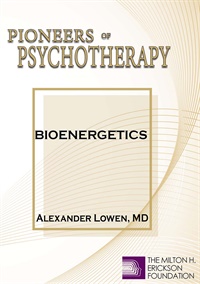
- Average Rating:
- Not yet rated
- Topic Areas:
- Clinical Demonstrations | Bioenergetics | Eating Disorders | Aging and Mortality | Psychotherapy | Abuse | Mind-Body
- Bundle(s):
- Pioneers of Psychotherapy Bundle
- Categories:
- Pioneers of Psychotherapy | Evolution of Psychotherapy | Evolution of Psychotherapy 2000
- Faculty:
- Alexander Lowen, MD
- Course Levels:
- Master Degree or Higher in Health-Related Field
- Duration:
- 00:59:00
- Format:
- Audio and Video
- Original Program Date:
- May 27, 2000
- Short Description:
- Alexander Lowen (2000) demonstrates with Ann, who he used as a ten years earlier. She reports that since that first session she has been free of severe asthma attacks. She is now troubled by the death of her father and mother, abuse from her brother, excessive weight gain and the onset of menopause. Lowen guides her through a series of movement exercises.
- Price:
- $59.00 - Base Price
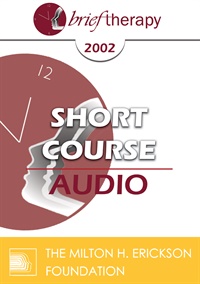
- Average Rating:
- Not yet rated
- Topic Areas:
- Short Courses | Abuse | Storytelling | Brief Therapy | Memory
- Categories:
- Brief Therapy Conference | Brief Therapy Conference 2002
- Faculty:
- Janice Gasker, DSW
- Duration:
- 1:19:27
- Format:
- Audio Only
- Original Program Date:
- Dec 12, 2002
- Short Description:
- Explore the empirical analysis of the life stories of Marilyn Monroe, Carl Jung, Virginia Woolf, DH Lawrence, Oprah Winfrey and others to identify components of healthy life narratives about sexual abuse. Hear intriguing life stories while learning new narrative techniques for helping adult victims of childhood sexual ·abuse to integrate traumatic memories into functional life stories.
- Price:
- $15.00 - Base Price
Tags: Abuse Storytelling Brief Therapy Memory
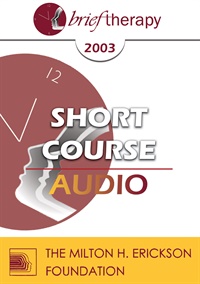
- Average Rating:
- Not yet rated
- Topic Areas:
- Short Courses | Addiction | Brief Therapy | Psychotherapy | Abuse | Motivation | Personality Disorders
- Categories:
- Brief Therapy Conference | Brief Therapy Conference 2003
- Faculty:
- Ralph Armstrong, MD
- Duration:
- 1:37:13
- Format:
- Audio Only
- Original Program Date:
- Dec 13, 2003
- Short Description:
- Motivation is crucial to successful recovery from Substance Use Disorders. Fifteen DSM IV conditions reduce the motivation needed to bond with programs that assist in abstinence. Child abuse and neglect are frequent in substance abusers, and a conceptualization of its role in substance abuse is given. Therapy for sequelae such as schizoid personality, resentment, pessimism and others are described. with treatment of Axis I and II disorders accomplished, and the effects of abuse/neglect allayed, involvement with 12 step programs is more likely.
- Price:
- $15.00 - Base Price
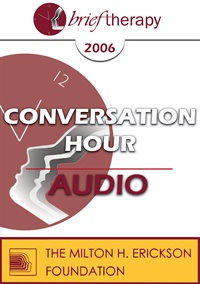
- Average Rating:
- Not yet rated
- Topic Areas:
- Conversation Hours | Abuse | Family Therapy | Brief Therapy
- Categories:
- Brief Therapy Conference | Brief Therapy Conference 2006
- Faculty:
- Frank Dattilio, PhD, ABPP
- Duration:
- 1:02:13
- Format:
- Audio Only
- Original Program Date:
- Dec 08, 2006
- Short Description:
- BT06 Conversation Hour 09 - Abuse in Families - Frank Dattilio, PhD, ABPP
- Price:
- $15.00 - Base Price
Tags: Abuse Brief Therapy Family Therapy
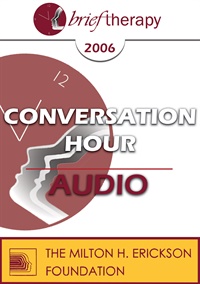
- Average Rating:
- Not yet rated
- Topic Areas:
- Conversation Hours | Abuse
- Categories:
- Brief Therapy Conference | Brief Therapy Conference 2006 | Pioneers in Couples and Family Therapy
- Faculty:
- Cloe Madanes, HDL, LIC
- Duration:
- 1:03:02
- Format:
- Audio Only
- Original Program Date:
- Dec 08, 2006
- Short Description:
- This session presents a strategic approach to addressing spousal abuse, emphasizing the use of third parties, such as extended family, to deter violence. Key techniques include creating intervention contracts involving disliked individuals and promoting empathy to prevent abuse. The discussion also covers strategies for breaking patterns of abusive relationships and the need to adapt therapy to fit diverse cultural norms.
- Price:
- $15.00 - Base Price
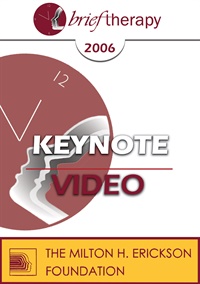
- Average Rating:
- Not yet rated
- Topic Areas:
- Keynotes | Abuse | Violence Prevention
- Categories:
- Brief Therapy Conference | Brief Therapy Conference 2006 | Pioneers in Couples and Family Therapy
- Faculty:
- Cloe Madanes, HDL, LIC
- Duration:
- 1:07:34
- Format:
- Audio Only
- Original Program Date:
- Dec 10, 2006
- Short Description:
- This keynote presents a structured approach to preventing spousal abuse, emphasizing interactional therapy, clear directives, and emotional healing. Key strategies include temporary separation, family involvement, creating meaningful rituals, and using behavioral contracts—such as tying a joint bank account to accountability measures—to deter violence and promote lasting change.
- Price:
- $15.00 - Base Price
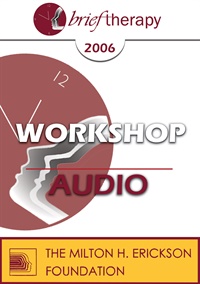
- Average Rating:
- Not yet rated
- Topic Areas:
- Workshops | Children and Adolescent Therapy | Abuse | Brief Therapy | Family Therapy | Strengths-Based
- Categories:
- Brief Therapy Conference | Brief Therapy Conference 2006
- Faculty:
- Matthew Selekman, MSW
- Duration:
- 2:30:03
- Format:
- Audio Only
- Original Program Date:
- Dec 09, 2006
- Short Description:
- Adolescent self-harming behavior is on the rise and one of the most challenging presenting problems therapists will face today in their clinical practice settings. Therapists referred these clients are often intimidated by their cutting and burning behaviors, the DSM IV labels they have been given, and the army of helping professionals involved with them and their families. many of these adolescents have experienced multiple treatment failures, feel emotionally disconnected from their parents, and come from families where there may be difficulties with marital or post-divorce conflicts, invalidating family interactions, gender power imbalance issues, or family secrets. In this hands-on, practice-oriented workshop, participants will learn a collaborative, strengths-based therapy approach that capitalizes on the strengths and resources of the adolescent, family members, concerned peers, adult inspirational others, and involved helpers from larger systems to rapidly co-construct solutions
- Price:
- $15.00 - Base Price
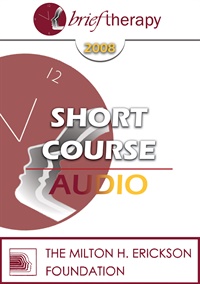
- Average Rating:
- Not yet rated
- Topic Areas:
- Short Courses | Love | Abuse | Children and Adolescent Therapy | Couples Therapy | Family Therapy | Hypnotherapy | Reframing
- Categories:
- Brief Therapy Conference | Brief Therapy Conference 2008
- Faculty:
- Ruperto Charles Torres, MA | Margarita Saez, MA | Ana Charles, MA
- Duration:
- 1:31:35
- Format:
- Audio Only
- Original Program Date:
- Dec 11, 2008
- Short Description:
- This workshop will offer a guide to understanding the inter-personal pattern of violent interactions. whether they may be between couples, parents and children, friends or co-workers. Effective strategies such as using positive questions, reframing comments, tasks, rituals and hypnotic procedures will be discussed.
- Price:
- $15.00 - Base Price
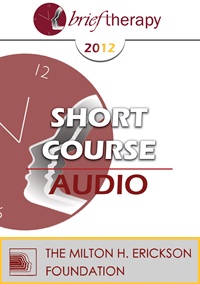
- Average Rating:
- Not yet rated
- Topic Areas:
- Short Courses | Improvisation | Abuse | Brief Therapy
- Categories:
- Brief Therapy Conference | Brief Therapy Conference 2012
- Faculty:
- Claudia Weinspach, Dipl. Psych
- Duration:
- 1:32:41
- Format:
- Audio Only
- Original Program Date:
- Dec 05, 2012
- Short Description:
- BT12 Short Course 19 – Applying Sensory Body Work and Improvisational Theater for Sexual Abuse Survivors in Brief Therapy – Claudia Weinspach, Dipl, Psych The utilization of body work and improvisational theater can be employed for different therapeutic purposes. In a therapy group with sexually abused survivors it is a useful tool in the tradition of Ericksonian therapy. Since sensory body work and improvisational theater elements are excellent tools to absorb the patients’ attention in an equally structured and playful way, they become actors and creators of their new body experience. This is an experiential workshop.
- Price:
- $15.00 - Base Price
Tags: Experiential Mind-Body
- Average Rating:
- Not yet rated
- Topic Areas:
- Keynotes | Domestic Violence | Research | Abuse | Couples Therapy | Relationships
- Categories:
- Brief Therapy Conference | Brief Therapy Conference 2016
- Faculty:
- John Gottman, PhD | Julie Gottman, PhD
- Course Levels:
- Master Degree or Higher in Health-Related Field
- Duration:
- 1:41:28
- Format:
- Audio and Video
- Original Program Date:
- Dec 08, 2016
- Short Description:
- Drs. John and Julie Gottman will present a state-of-the-art review of how to conceptualize and treat the highly intractable problem of domestic violence toward intimate partners. They will review the research literature and present a conceptualization of the issues in treating this population. They will describe a highly successful randomized clinical trial study and the results that demonstrate long-term follow up effectiveness.
- Price:
-
Sale is $29.00
price reduced from Base Price - $59.00
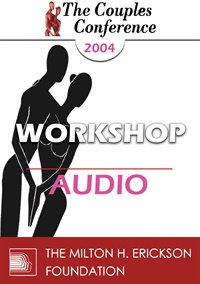
- Average Rating:
- Not yet rated
- Topic Areas:
- Workshops | Couples Therapy | Domestic Violence | Abuse
- Categories:
- Couples Conference | Couples Conference 2004 | Pioneers in Couples and Family Therapy
- Faculty:
- Cloe Madanes, HDL, LIC
- Duration:
- 1:53:07
- Format:
- Audio Only
- Original Program Date:
- Mar 28, 2004
- Short Description:
- Exploration of structured strategies for working with violent couples including separation, involving extended family, and addressing spiritual pain. Emphasis on planned interventions, repentance, and accountability from the abusive partner. Techniques discussed include executive meetings in public settings, symbolic rituals, and financial consequences to deter violence. Madanes highlights the role of reparation, community support, and social services in fostering safety and potential reconciliation.
- Price:
- $15.00 - Base Price
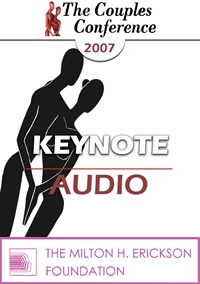
- Average Rating:
- Not yet rated
- Topic Areas:
- Keynotes | Abuse | Couples Therapy | Domestic Violence | Protective Strategies
- Categories:
- Couples Conference | Couples Conference 2007 | Pioneers in Couples and Family Therapy
- Faculty:
- Cloe Madanes, HDL, LIC
- Duration:
- 59:31
- Format:
- Audio Only
- Original Program Date:
- Apr 27, 2007
- Short Description:
- Strategies for addressing domestic violence through an interactional lens with emphasis on empathy, clear directives, and structured interventions like separation, rituals, and family involvement. Madanes discusses recent legal changes re-allowing couples therapy in these cases and stresses the role of universal human needs in conflict. Also outlines efforts to broaden access to therapy through multimedia collaborations.
- Price:
- $15.00 - Base Price
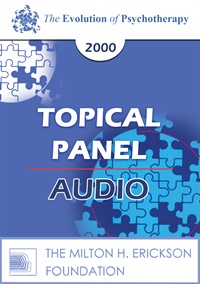
- Average Rating:
- Not yet rated
- Topic Areas:
- Post-Traumatic Stress Disorder (PTSD) | Topical Panels | Abuse | Psychotherapy
- Categories:
- Evolution of Psychotherapy | Evolution of Psychotherapy 2000 | Pioneers in Couples and Family Therapy
- Faculty:
- Frank Pittman III, M.D. | Cloe Madanes, HDL, LIC | Donald Meichenbaum, PhD | Francine Shapiro, PhD
- Duration:
- 55 Minutes
- Format:
- Audio Only
- Original Program Date:
- May 27, 2000
- Short Description:
- This panel examines evolving strategies for treating PTSD and abuse, emphasizing the need to support victims as well as change perpetrators’ behavior. Topics include the effectiveness of EMDR in reducing PTSD symptoms, a 96% success rate in reducing repeat offenses through structured remorse-based interventions, and the high prevalence of abuse histories in psychiatric patients. The discussion calls for integrating diverse therapeutic methods to address trauma more effectively. Moderated by Michael Yapko, PhD.
- Price:
- $15.00 - Base Price
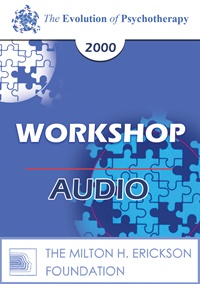
- Average Rating:
- Not yet rated
- Topic Areas:
- Family Therapy | Workshops | Abuse
- Categories:
- Evolution of Psychotherapy | Evolution of Psychotherapy 2000 | Pioneers in Couples and Family Therapy
- Faculty:
- Cloe Madanes, HDL, LIC
- Duration:
- 1 Hour 13 Minutes
- Format:
- Audio Only
- Original Program Date:
- May 25, 2000
- Short Description:
- This workshop presents a 15-step method for preventing family violence, with a 96% success rate in reducing repeat offenses among adolescent sex offenders. Key strategies include involving the whole family, addressing spiritual pain, and requiring public expressions of remorse. Additional approaches for marital violence, suicide prevention, and child neglect emphasize accountability, extended family support, and building self-esteem.
- Price:
- $15.00 - Base Price
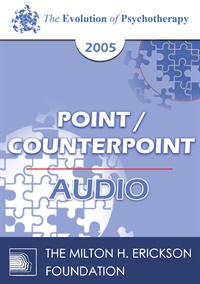
- Average Rating:
- Not yet rated
- Topic Areas:
- Point/Counterpoint Sessions | Abuse | Memory | Psychotherapy | Trauma
- Categories:
- Evolution of Psychotherapy | Evolution of Psychotherapy 2005
- Faculty:
- Francine Shapiro, PhD | Otto Kernberg, MD
- Duration:
- 1 Hour 13 Minutes
- Format:
- Audio Only
- Original Program Date:
- Dec 08, 2005
- Short Description:
- EP05 Point/Counterpoint 09 - Ending the Cycle of Violence - Francine Shapiro, Ph.D. The Adaptive Information Processing model, which guides EMDR, posits that dysfunctional beliefs, emotions and behaviors are often a direct manifestation of etiological events that have been improperly stored in memory. Implications of the model underscore the obligation of our profession to treat both victims and perpetrators of abuse and violence worldwide.
- Price:
- $15.00 - Base Price
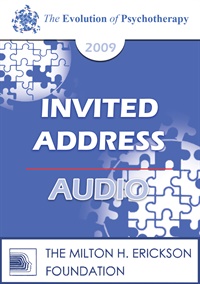
- Average Rating:
- Not yet rated
- Topic Areas:
- Invited Addresses | Psychotherapy | Abuse | Children and Adolescent Therapy
- Categories:
- Evolution of Psychotherapy | Evolution of Psychotherapy 2009 | Pioneers in Couples and Family Therapy
- Faculty:
- Cloe Madanes, HDL, LIC
- Duration:
- 52 Minutes
- Format:
- Audio Only
- Original Program Date:
- Dec 13, 2009
- Short Description:
- Cloe Madanes shares case-based strategies for treating children and adolescents. Stories include resolving tantrums through imaginative play, improving family communication amid financial stress, and supporting anorexia recovery through parental honesty and compassion.
- Price:
- $15.00 - Base Price
- Average Rating:
- Not yet rated
- Topic Areas:
- Topical Panels | Abuse | Family Therapy | Psychotherapy | Addiction
- Categories:
- Evolution of Psychotherapy | Evolution of Psychotherapy 2013 | Pioneers in Couples and Family Therapy
- Faculty:
- Claudia Black, PhD | Cloe Madanes, HDL, LIC | Julie Gottman, PhD
- Course Levels:
- Master Degree or Higher in Health-Related Field
- Duration:
- 58:16
- Format:
- Audio and Video
- Original Program Date:
- Dec 14, 2013
- Short Description:
- Discover powerful insights from three experts who unpack the realities of abuse in families affected by addiction. The panel examines abuse in families, revealing critical insights into physical and sexual violence within addictive households. Experts share groundbreaking research on domestic violence, juvenile sex offender treatment, and family healing strategies. Key findings include higher abuse rates in substance-abusing homes, innovative therapeutic interventions, and the importance of comprehensive family involvement in addressing trauma and preventing future violence.
- Price:
-
Sale is $29.00
price reduced from Base Price - $59.00
Credit available - Click Here for more information
- Average Rating:
- Not yet rated
- Topic Areas:
- Workshops | Post-Traumatic Stress Disorder (PTSD) | Trauma | Storytelling | Constructive Narrative | Addiction | Abuse | Borderline | Psychotherapy
- Bundle(s):
- Learning Track - EP17 Trauma Stream
- Categories:
- Evolution of Psychotherapy | Evolution of Psychotherapy 2017 | Evolution of Psychotherapy Trauma Learning Track | Online Continuing Education
- Faculty:
- Donald Meichenbaum, PhD
- Course Levels:
- Master Degree or Higher in Health-Related Field
- Duration:
- 2:48:12
- Format:
- Audio and Video
- Original Program Date:
- Dec 13, 2017
- Short Description:
- Ways to implement the core tasks of psychotherapy with patients who evidence PTSD and co-morbid disorders of prolong and complicated grief, Substance Abuse Disorders and Borderline Personality Disorders. A case conceptualization model of risk and protective factors and incorporates a constructive narrator perspective will be presented.
- Price:
-
Sale is $29.00
price reduced from Base Price - $59.00
- Average Rating:
- Not yet rated
- Topic Areas:
- Abuse | Speeches | Psychotherapy | Ethical Practice | Therapeutic Relationship | Therapist Development
- Categories:
- Evolution of Psychotherapy | Evolution of Psychotherapy 2021 | Pioneers in Couples and Family Therapy
- Faculty:
- Claudia Black, PhD
- Course Levels:
- Master Degree or Higher in Health-Related Field
- Duration:
- 1 hour
- Format:
- Audio and Video
- Original Program Date:
- Dec 04, 2021
- Short Description:
- An examination of how abandonment in childhood creates toxic shame, leading to coping mechanisms like controlling behavior and perfectionism. This speech will also reveal how unmet emotional and physical needs impact personal development, and will offer insights into healing through empathy and self-awareness.
- Price:
- $59.00 - Base Price
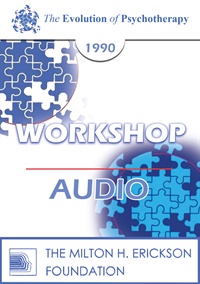
- Average Rating:
- Not yet rated
- Topic Areas:
- Workshops | Abuse | Psychotherapy | Strategic Therapy
- Categories:
- Evolution of Psychotherapy | Evolution of Psychotherapy 1990 | Pioneers in Couples and Family Therapy
- Faculty:
- Cloe Madanes, HDL, LIC
- Duration:
- 1 Hour 44 Minutes
- Format:
- Audio Only
- Original Program Date:
- Dec 13, 1990
- Short Description:
- This session presents a strategic therapy model focused on creativity, flexibility, and tailoring interventions to individual cases. Techniques include directives, symbolic acts, and rituals, addressing issues of control, love, protection, and forgiveness. A case example follows a mother with a criminal past as she rebuilds her life, reconnects with her children, and transforms her family relationships...demonstrating how structure, empathy, and responsibility can drive lasting change.
- Price:
- $15.00 - Base Price
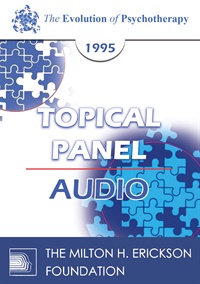
- Average Rating:
- Not yet rated
- Topic Areas:
- Topical Panels | Post-Traumatic Stress Disorder (PTSD) | Abuse | Psychotherapy
- Categories:
- Evolution of Psychotherapy | Evolution of Psychotherapy 1995 | Pioneers in Couples and Family Therapy
- Faculty:
- Cloe Madanes, HDL, LIC | Donald Meichenbaum, PhD | Francine Shapiro, PhD | Lenore Walker, EdD
- Duration:
- 57 Minutes
- Format:
- Audio Only
- Original Program Date:
- Dec 15, 1995
- Short Description:
- This panel on post-traumatic stress and abuse presents a range of trauma treatment strategies. Approaches include structured apology and accountability from perpetrators, EMDR's eight-phase trauma processing model, and cognitive-emotional interventions for repeated trauma and battered women’s syndrome. The discussion also underscores the importance of thorough victimization assessments and recognizing the risk of secondary trauma in therapists. Moderated by Brent Geary, PhD.
- Price:
- $15.00 - Base Price
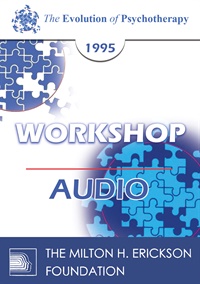
- Average Rating:
- Not yet rated
- Topic Areas:
- Workshops | Femininity | Sex and Sexuality | Gender | Abuse | Psychotherapy
- Categories:
- Evolution of Psychotherapy | Evolution of Psychotherapy 1995
- Faculty:
- Lenore Walker, EdD
- Duration:
- 2 Hours 8 Minutes
- Format:
- Audio Only
- Original Program Date:
- Dec 13, 1995
- Short Description:
- Presentation of the principles of feminist therapy as utilized with women who have been battered, sexually abused as children or adults. Such techniques also can be used to treat sexual misconduct by therapists and sexual harassment, including dealing with issues such as dissociation, obsessions and cognitive distortions.
- Price:
- $15.00 - Base Price
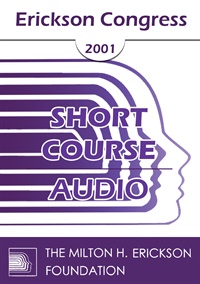
- Average Rating:
- Not yet rated
- Topic Areas:
- Short Courses | Addiction | Utilization | Abuse | Brief Therapy | Ideomotor
- Categories:
- Erickson Congress 2001 | Erickson Congress
- Faculty:
- Bart Walsh, MSW
- Duration:
- 1:20:20
- Format:
- Audio Only
- Original Program Date:
- Dec 06, 2001
- Short Description:
- This presentation poses a substance abuse treatment which acknowledges and accommodates the personal needs being addressed by substance use, bypasses perceived resistance and employs idiosyncratic psycho-biological learning to achieve a body-mind gestalt complementary to the client's sobriety. Client self-empowerment and relapse prevention are built into the intervention. This method develops a safe framework for addressing any subsequent mental health themes directly or indirectly related to substance misuse. Ideomotor questioning is employed in this procedure.
- Price:
- $15.00 - Base Price
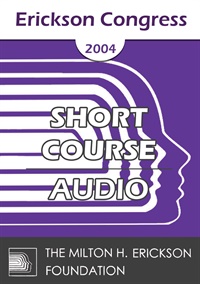
- Average Rating:
- Not yet rated
- Topic Areas:
- Short Courses | Utilization | Addiction | Abuse
- Categories:
- Erickson Congress | Erickson Congress 2004
- Faculty:
- Bart Walsh, MSW
- Duration:
- 1:19:37
- Format:
- Audio Only
- Original Program Date:
- Dec 02, 2004
- Short Description:
- This workshop poses a brief substance abuse treatment which acknowledges and accommodates the personal needs being addressed by substance abuse. Client self-empowerment and relapse prevention are built into the intervention. This method develops a safe framework for addressing any subsequent mental health themes directly or indirectly related to substance misuse. A particular form of body language know as ideomotor signaling is established in this procedure.
- Price:
- $15.00 - Base Price
Tags: Abuse Addiction Utilization Ideomotor


